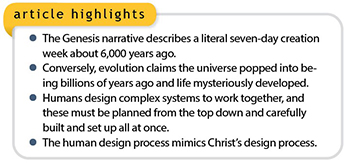 We are clearly told in the book of Genesis that God created the heavens and the earth in a very short sequence of time, six literal days. The Hebrew text is grammatically put together using a specific verbal construct called a waw consecutive that defines historical narrative. Each individual day (yoÌ‚m) is further defined by the nouns evening (‘ereb) and morning (boÌ‚qer) and an ordinal number (e.g., the sixth day, yoÌ‚m hasÌŒisÌŒsÌŒiÌ‚y [Genesis 1:31]).
We are clearly told in the book of Genesis that God created the heavens and the earth in a very short sequence of time, six literal days. The Hebrew text is grammatically put together using a specific verbal construct called a waw consecutive that defines historical narrative. Each individual day (yoÌ‚m) is further defined by the nouns evening (‘ereb) and morning (boÌ‚qer) and an ordinal number (e.g., the sixth day, yoÌ‚m hasÌŒisÌŒsÌŒiÌ‚y [Genesis 1:31]).
If this weren’t clear enough, the six-day creation is affirmed twice in Exodus: “For in six days the LORD (Yahweh) made the heavens and the earth” (20:11, 31:17). Furthermore, we are told in these verses and also in Genesis 2:2 that God rested on the seventh day, which Hebrews 4:4 cites in the New Testament: “And God rested on the seventh day from all His works.” This is where we get our seven-day calendar week, the only demarcation of time not built on a solar or lunar cycle.
In contrast to the Scriptures, evolutionists would like us to believe that the universe somehow exploded into existence and then self-assembled itself through random, chance processes into galaxies, solar systems, stars, and planets. Then the essential information-rich biomolecules for life mysteriously popped into existence on Earth and self-assembled into a fully replicating cell.
This initial cell line then supposedly evolved through random mutation “acted on” by a mystical agent called natural selection into the plethora of plants and animals we see in the fossil and living records. And of course, there’s no observable natural process to account for any of this materialistic speculation. In both the fossil and living records, we see creatures fully formed in their various kinds without any evidence of biological evolution whatsoever (e.g., transitional forms).
Thus, the obvious implication from the incredible engineering of our solar system, the earth, and all the living systems it contains is that an all-powerful and all-knowing Creator brought them into existence, and the book of Genesis is the only coherent and systematic account of this. But why the logical stepwise sequence of various creative events over the short course of six days?
The best way to consider the rapid sequential nature of the creation week narrative is by taking an engineering-based approach. No one can logically deny that our solar system, the earth, and all its living creatures function as a massively complex interconnected system of subsystems. In the present age of human ingenuity, complex systems—whether they are cars, washing machines, or computers—must be engineered and assembled with a high level of foresight and intelligence all at once in a short sequence of time for them to work. A partially assembled car or computer is essentially worthless as an end product.1
The creation account of Genesis follows this line of commonsense reasoning by describing how a divine Engineer (Yahweh Elohim) constructed our complex, interconnected cosmos and its living creatures in a short period of time, six days.
But is it a reasonable approach to compare human engineering with God’s work of creation?2,3 In Psalm 115:4-8, God rebukes the Israelites for engineering inanimate idols with the nonfunctional attributes of a humanlike entity (having mouths, eyes, ears, and noses). While the overriding lesson in this passage is that we shouldn’t worship anything, including “the work of men’s hands,” above the living God, there’s more to glean from this text.
One of humans’ unique attributes is their ability to purposefully craft and engineer elaborate things. This is one aspect of humans being created in God’s image (Genesis 1:27) as compared to other biological life forms. In Psalm 115:4-8, the Lord uses this fundamental and inherently understood principle to highlight idolatry in a contrastive scenario—low-level human engineering vs. God’s all-powerful engineering.
In the modern world of bioengineering, scientists at research centers across the world imitate the elaborate God-created systems found in living creatures using this same inherent perception of design—whether they want to acknowledge it or not. This is because humans inherently perceive design and are held accountable for it. “For since the creation of the world His invisible attributes are clearly seen, being understood by the things that are made…so that they are without excuse” (Romans 1:20).
Based on this engineering principle of system design, the creation week entails the sequential construction of elaborate interconnected systems over a short period of time by an omnipotent Creator God, the Lord Jesus Christ, that we can immediately appreciate from our own built-in perception of how things are constructed.
References
- Guliuzza, R. J. 2010. Discovering Life’s Complex Patterns of Design. Acts & Facts. 39 (7): 10-11.
- Guliuzza, R. J. 2017. Engineered Adaptability: Engineering Principles Point to God’s Workmanship. Acts & Facts. 46 (6): 16-19.
- Guliuzza, R. J. 2017. Engineered Adaptability: Engineering Principles Should Guide Biological Research. Acts & Facts. 46 (7): 17-19.
* Dr. Tomkins is Director of Research at the Institute for Creation Research and earned his Ph.D. in genetics from Clemson University.





















